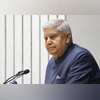The Congress-led INDIA bloc on Tuesday filed a no-confidence motion against Rajya Sabha Chairperson Jagdeep Dhankhar, accusing him of a biased conduct in overseeing the House. The notice, filed for the first time in Indian parliamentary history, sparked heated arguments and led to an adjournment.
This motion follows two days of turbulence in Parliament, with both Houses witnessing clashes between the BJP and the opposition. The BJP accused Congress MP Sonia Gandhi and businessman George Soros of conspiring to harm India’s economy, national security, and global image — a charge Congress dismissed as ‘baseless’.
Sixty opposition MPs, including members from the Samajwadi Party, Trinamool Congress, and AAP — parties often at odds with Congress — have expressed support for the motion. The move, unprecedented in India’s parliamentary history, was initiated under Article 67(b) of the Constitution, which provides for the removal of the Vice President, who also serves as the ex-officio Rajya Sabha Chair.
Why did INDIA bloc move 'no-confidence' against Dhankhar?
The INDIA bloc justified the motion by citing a pattern of alleged bias by Dhankhar. They particularly objected to his acceptance of BJP speeches linking Sonia Gandhi to George Soros, while dismissing 11 previous notices from opposition MPs. They also criticised his refusal to allow debates on pressing issues like communal violence in Uttar Pradesh, cyclone damage in Tamil Nadu, ethnic clashes in Manipur, and the prolonged farmers’ protest.
Congress leader Jairam Ramesh accused the Chair of conducting proceedings in a “highly partisan” manner, while Priyanka Gandhi Vadra lamented the frequent adjournments orchestrated by the ruling party. In contrast, BJP leaders, including Union Ministers Giriraj Singh and Kiren Rijiju, defended Dhankhar and accused the opposition of stalling Parliament.
Also Read
What is Sonia Gandhi-George Soros allegation?
The BJP’s accusations stemmed from a French news report suggesting connections between the OCCRP (Organized Crime and Corruption Reporting Project), partly funded by Soros, and the US government. The BJP alleged that Congress leverages OCCRP reports to discredit India. Rahul Gandhi also faced BJP criticism, with claims linking him, Soros, and certain US agencies in a conspiracy to destabilize the country. Congress firmly rejected these allegations, asserting its patriotism.
What is Article 67(b) and will Dhankhar be removed?
Article 67(b) specifies that the Vice President can be removed via a resolution supported by a majority in the Rajya Sabha and subsequently approved by the Lok Sabha. However, a 14-day notice is mandatory, which could push the debate beyond the current session ending December 20. The opposition acknowledges the unlikelihood of success but views the motion as symbolic, aiming to signal discontent with the ruling party’s governance.
Despite speculations, the INDIA bloc lacks the required numbers. The Rajya Sabha has 245 members, of which 14 seats are vacant. The opposition controls 85 seats, far below the 116 needed for a majority. Even if fence-sitters like the YSR Congress and BJD were to back the motion, the numbers remain insufficient. Parliamentary Affairs Minister Kiren Rijiju highlighted this, declaring the motion destined to fail in both Houses, given the BJP’s commanding majority in the Lok Sabha.
The opposition, including the non-INDIA bloc members, holds only 85 seats in the Rajya Sabha.
Can fence-sitting parties bridge the gap?
In an attempt to bridge this gap, Congress turned its attention to the YSR Congress Party (YSRCP). “Will Jagan (Mohan Reddy’s) party have the courage to support the motion... or will he stay loyal to Modi and Shah while making empty statements?” Congress MP Manickam Tagore questioned in a post on X (formerly Twitter).
The YSRCP currently has eight MPs in the Rajya Sabha. Additionally, the seven MPs from Odisha’s Biju Janata Dal (BJD) could also be pivotal. BJD leader and former Chief Minister Naveen Patnaik stated, “We are examining the motion and will take whatever step is necessary.”
While the no-confidence motion is unlikely to succeed, it has highlighted deepening tensions between the ruling BJP and opposition alliances.
[With agency inputs]

)